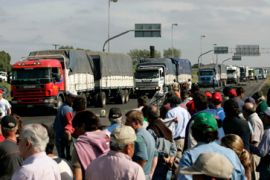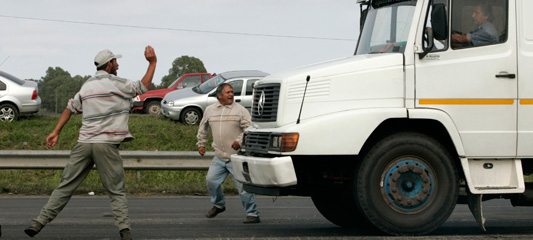Argentine farm talks inconclusive
Officials and farmers fail to reach agreement on the increase in export tax.

 |
| Truck drivers have clashed with farmers who had set up roadblocks across Argentina [Reuters] |
Negotiations between Argentinian officials and striking farmers has ended without any agreement on the increase in export tax, but the government has vowed to resume talks next week.
While some hardline strikers vowed on Saturday to immediately resume a highway blockade at a major stranglehold north of the capital Buenos Aires, there were no reports of other blockades going back up after Friday’s truce.
Keep reading
list of 4 itemsWhy is Germany maintaining economic ties with China?
Behind India’s Manipur conflict: A tale of drugs, armed groups and politics
China’s economy beats expectations, growing 5.3 percent in first quarter
Leaders of the farmers said they would consult the rank-and-file to determine the next course of action after suspending a 16-day strike against higher taxes on grains exports.
The protests had halted grain exports and led to food shortages in parts of the country, presenting Cristina Kirchner, the president, with her biggest crisis since taking office in December.
Blocked roads
| Argentina’s economic woes |
 Although rich in natural resources, Argentina’s 39.5 million population has suffered in several economic crises in recent decades Fiscal deficits, high inflation and mounting debts culminated in 2001’s economic crisis, which sparked protests, currency devaluation and debt defaults Sixty per cent of Argentinians were also pushed below the poverty line C ountry’s main exports include soybeans, corn, wheat, petroleum, gas and vehicles Inflation is currently in double figures and farmers say recent tax increases on goods such as soybeans, sunflower oil and beef by up to 45 per cent to boost revenues will cripple their livelihoods Source: CIA World Factbook |
The protest, over a steep increase in taxes levied on soya beans, had been escalating, with demonstrations for and against the government and clashes between farmers and transporters angry about the blocked roads.
The taxes, of up to 45 per cent, were imposed on a range of goods including soya beans, sunflower oil and beef in a bid to boost state revenue at a time of exceptionally high commodity prices and to curb high inflation in the country.
Kirchner had labelled the farmers “extortionists”, and said high commodities prices on the world market, coupled with Argentina’s devalued peso, had made many rural landowners very wealthy.
Some of the country’s middle class, itself decimated in the a devastating financial collapse in 2001, sided with the farmers and held solidarity demonstrations in Buenos Aires.
Kirchner’s supporters – drawn from the large poor underclass – countered with their own marches and in some cases clashes erupted.
On Thursday, she had struck a more conciliatory tone, pleading with farmers to end their strike.
“The government’s doors are open but please, lift this strike for the sake of the people,” she said.